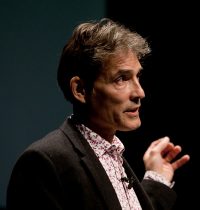
Dr. Bonanno is chair of the department of counseling and clinical psychology at Columbia University’s Teachers College. He is a world leader on research around trauma, bereavement, and resilience. His interest in how people cope with difficult events and circumstances has led to studies around grief, trauma, acute medical situations, and other unpleasant events.
I met Dr. Bonanno when I was in grad school at The Catholic University of America and recognized then that he was someone who wasn’t afraid to take a controversial or unorthodox position in his research. He was also an amazing methodologist and is extremely gifted at coming up with new research methods than other researchers then adopt. Today, I finally got got pick his brain about why he’s chosen the unconventional path instead of sticking with safer topics and questions in his research.
As Mihaly Csikszentmihalyi observed about Dr. Bonanno, he is a researcher who loves ideas. As such, he believes it’s important to let curiosity drive your research and to understand that sometimes curiosity will lead to dead ends. But there are great rewards in asking new questions in new ways (you often get different answers) and in being willing to call much of psychological dogma what it is — assumptions. For instance, he had a hunch that the conventional idea that emotional suppression is maladaptive was incorrect, so he spent months thinking of ways to measure suppression as an ability, as a skill. The effort paid off and his research on expressive flexibility is now being incorporated in dozens of labs around the world and already has been cited hundreds of times.
In this episode, you’ll learn…
- The rewards and consequences of pursuing controversial questions
- What to do when your work is published…and then ignored
- About the weak basis for many assumptions within psychology
- How to protect your curiosity from being squelched by the day-to-day
- Why it’s especially easy for those young in their careers to stay within the safe realm of the conventional
- Why Mihaly Csikszentmihalyi encouraged him to look for employment with a small school and why you might too
- How to deal with disappointments and setbacks
- How to keep the pragmatic details of work from encroaching on your mental space
Tips from the episode
On how to maintain motivation when doing something unconventional…
- You have to be internally motivated by the questions
- Begin with “What do we know and how do we know it? How solid is the evidence?”
- When you find something counterintuitive and trust your methods, it’s usually easy to stay motivated
- If you believe you’re on the right track, that’s rewarding in itself
- Follow your own interests
On dealing with setbacks and the parts of your job that you don’t enjoy
- Remember that the unusable finding of today might be usable in the future
- Hang in there. Keep pursuing the ideas that motivate you.
- Be creative with the tasks you have. Put your own spin on things. Modify things so they’re more amenable to your goals.
- Be open to failure and admit when something has failed.
Links from the episode:
- The Structure of Scientific Revolutions by Thomas Kuhn
- Excellent Sheep: The Miseducation of the American Elite and the Way to a Meaningful Life by William Deresiewicz
- Expressive Flexibility
- Dr. Bonanno’s bio page at Columbia
Research Matters Podcast is hosted by Jason Luoma, who can be found on Twitter @jasonluoma or Facebook at: facebook.com/jasonluomaphd. You download the podcast through iTunes, Stitcher, or Spotify.
Podcast: Play in new window | Download